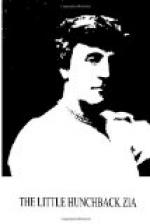He had stood and looked at her in the silence of the dead, his immense, black Syrian eyes growing wider and wider with childish horror. He had always regarded her with slavish fear. What he was to her he did not know; neither did he know how he had fallen into her hands. He knew only that he was not of her blood or of her country and that he yet seemed to have always belonged to her. In his first memory of his existence, a little deformed creature rolling about on the littered floor of her uncleanly hovel, he had trembled at the sound of her voice and had obeyed it like a beaten spaniel puppy. When he had grown older he had seen that she lived upon alms and thievery and witchlike evil doings that made all decent folk avoid her. She had no kinsfolk or friends, and only such visitors as came to her in the dark hours of night and seemed to consult with her as she sat and mumbled strange incantations while she stirred a boiling pot. Zia had heard of soothsayers and dealers with evil spirits, and at such hours was either asleep on his pallet in a far corner or, if he lay awake, hid his face under his wretched covering and stopped his ears. Once when she had drawn near and found his large eyes open and staring at her in spellbound terror, she had beaten him horribly and cast him into the storm raging outside.
A strange passion in her seemed her hatred of his eyes. She could not endure that he should look at her as if he were thinking. He must not let his eyes rest on her for more than a moment when he spoke. He must keep them fixed on the ground or look away from her. From his babyhood this had been so. A hundred times she had struck him when he was too young to understand her reason. The first strange lesson he had learned was that she hated his eyes and was driven to fury when she found them resting innocently upon her. Before he was three years old he had learned this thing and had formed the habit of looking down upon the earth as he limped about. For long he thought that his eyes were as hideous as his body was distorted. In her frenzies she told him that evil spirits looked out from them and that he was possessed of devils. Without thought of rebellion or resentment he accepted with timorous humility, as part of his existence, her taunts at his twisted limbs. What use in rebellion or anger? With the fatalism of the East he resigned himself to that which was. He had been born a deformity, and even his glance carried evil. This was life. He knew no other. Of his origin he knew nothing except that from the old woman’s rambling outbursts he had gathered that he was of Syrian blood and a homeless outcast.
But though he had so long trained himself to look downward that it had at last become an effort to lift his heavily lashed eyelids, there came a time when he learned that his eyes were not so hideously evil as his task-mistress had convinced him that they were. When he was only seven years old she sent him out to beg alms for her, and on the first day of his going forth she said a strange thing, the meaning of which he could not understand.




